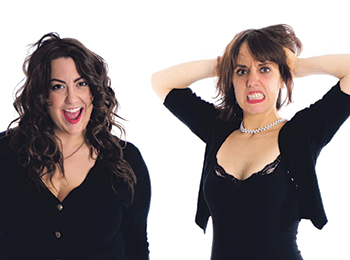When Natalie Norman, 28, first started doing stand-up four years ago, another female comedian gave her what was meant to be well-intentioned advice: don’t talk about your period on stage.
Norman, a Toronto native and veteran of the Young Judaea summer camp system, said she found the remark “extremely offensive.”
Soon after, she befriended Jess Beaulieu, another female comic, also 28, who Norman said she knew to be “a very political, opinionated, feminist woman.”
They got to talking about the constraints of operating in what many female comics hold is a “man’s game” and the pervasive myth that female comedians only make jokes about their periods.
“It’s this ongoing theory held by dudes [in the comedy scene],” Beaulieu said, one that causes many female comedians to avoid the subject outright, fearful of fueling the stereotype.
“It isn’t true at all,” she noted, “but if it were, there would be no problem with that… Women being told we aren’t permitted to touch certain subjects, especially in relation to our bodies, so as not to offend men. That’s oppression.”
She stressed that the falsehood stems from “a place of disgust toward the female anatomy,” adding, “Not all women menstruate, but a lot do, and it’s a pretty big life experience.”
In 2013, Norman decided to address the stigma head on.
“I was like, fuck this, I’m going to do a comedy show that’s all about periods,” she said.
She teamed up with another comic to produce a live show featuring female comedians sharing jokes and stories about their periods.
Called Stories from the Red Tent, its stated purpose was to defy the cultural silence surrounding menstruation.
“People really seemed to connect with the jokes,” Beaulieu, who performed in it, said.
Emboldened by the positive reception, Norman and Beaulieu decided to develop a weekly podcast devoted exclusively to the subject of menstruation.
And so, The Crimson Wave, a 45-minute podcast, available on iTunes, was born.
Running for a little more than a year now, each episode features Beaulieu and Norman interviewing a guest, generally another female comedian, about her experience of menstruation.
They ask about things like first periods, familial advice, regularity and consistency of flow, birth control, whether the guest uses tampons, pads or a menstrual cup, cramps, pre-menstrual syndrome, childbirth and whether the guest engages in sexual activity during her period.
They often veer into broader discussions of feminism, female sexuality, health care access, mental health and women’s experiences of their bodies within a patriarchal society.
Norman and Beaulieu are frank and funny, bantering and laughing easily with their guests, but they’re also highly compassionate.
“Guests often tell us stories they’ve never told anyone else,” Norman said.
In one episode, a comedian recounts the trauma of getting her first period in a school classroom. Another talks about the discomfort of getting her period four years after her twin sister, and another recalls contending with menstruation as an adolescent in an all-male household.
Guests frequently express how liberating – cathartic, even – it is to discuss something so culturally suppressed. Some have gone on to write period jokes into their comedy acts.
Feedback for The Crimson Wave has been largely positive, the women say, but last fall, they entered a CBC competition called Comedy Coup, to develop a television pilot (they made it to the second round), and a video they posted online, featuring them discussing ways to use menstrual blood around the house, garnered criticism.
“People called us gross, said they wanted to throw up,” Norman said. “I think it’s strange that when it’s menstrual blood, people are grossed out, but if it’s a body being chopped up and dragged across the screen, like in so many movies, everyone’s fine with that.”
Beaulieu emphasized the double-edged sword of publicly addressing menstruation, both within comedy and generally. When a woman acknowledges her period, she said, she’s regarded by patriarchal society as weak or hyper-emotional, while pretending it doesn’t exist reinforces the notion it’s shameful.
“It’s ridiculous that women are looked upon as weak for feeling the effects of something biological, which has existed since the dawn of time,” she said.
Norman and Beaulieu are determined to continue challenging the menstruation taboo, and say they’ve begun to see some change.
“I think women in general, and specifically comedians, are becoming more comfortable sharing stories about their bodies and expressing opinions in relation to menstruation,” Beaulieu said. “We are pushing back against the patriarchy, and I couldn’t be happier.”
